- Home
- Allison Brennan
Too Far Gone Page 2
Too Far Gone Read online
Page 2
“Excellent.” Young handed him the bullhorn. “Work your magic, Leo. Godspeed.”
Proctor took a breath, visibly relaxed, then turned on the bullhorn.
“This is Leo Proctor of the FBI. I will be calling into the coffee shop. I’d like you to answer, just to talk. Just see how you’re doing, how the other people are doing.”
He then nodded to Young’s assistant, a uniform by the name of Jones, who handed him a phone already set to dial into the Java Antonio main number and record the conversation.
They let the phone ring more than thirty times. There was no answer and Proctor ended the call.
“Lieutenant,” Jones said after listening to his radio, “we have an ID. Charles James McMahon, forty-six, address in Helotes per DMV. Two deputies are on their way now.”
“Married? Kids? Employer?”
“Unknown, we’re working on it.”
“Work faster. Something triggered him, we need to know what so no one gets hurt.”
“Yes, sir,” Jones said, already on his phone.
Proctor got on the bullhorn again. “Mr. McMahon—Charles—this is Leo Proctor. I really need you to pick up the phone. I know you don’t want to hurt anyone. We need to talk. You and me. We can work this out, but I’m sure you don’t like shouting through a bullhorn any more than I do.”
He dialed again, waited. No answer. He hung up. He didn’t show any frustration, any rush. “As long as he’s calm, we can get out of this,” he said almost to himself. “Lucy, get Yancey out here. We need eyes in.”
Lucy briskly walked to the tactical van. Tim Yancey was a technology analyst in their office and in charge of the equipment during tactical operations. He was a bit high-strung, skinny, and sharp on his feet.
“I know, I know,” Tim said before Lucy could speak. “It’s almost calibrated. Okay, okay,” he said to himself and followed Lucy over to the staging area which had a direct line of sight to the coffee shop.
“I need to expand the range,” he said as he walked up and put the thermal imaging camera on a table next to the SAPD tactical van. “Okay, okay,” he mumbled again and pressed a few buttons to expand the field.
A blob of orange quickly took on distinct human shapes. Most were on the floor. Young immediately pointed to one on the left that was moving and had another shape close to him. “That’s our guy. He’s holding a hostage. I count … fifteen plus the gunman?”
“I concur,” Proctor said.
Young asked Tim, “Why are these three shapes faded?”
“They’re in another room,” Tim said. “Probably the storage room, a bathroom—I don’t have the exact layout.”
Young motioned at one of his men. “Where are the blueprints I asked for?”
“Coming.”
“I needed them five minutes ago.”
“He didn’t plan this,” Lucy said.
Everyone looked at her. She didn’t realize she’d spoken out loud.
“If he did,” she continued, “he would have made sure that everyone was in the main room. Those three had time to hide in the back and he didn’t notice? Others escaped? A dozen people ran out before he locked the place down. I think he would notice if he had a room full of customers and no employees.”
“Point taken,” Young said. “Don’t know if that makes him more or less dangerous. Get him talking, Leo, I’m going to push my people to get us more intel.”
Leo used the bullhorn. “Charles, this is Leo Proctor again. I’m calling you now. Please pick up the phone.”
He hit REDIAL.
Lucy adjusted her earpiece and heard the ringing phone. She watched Tim’s thermal imaging system and saw the suspect cross the room—with a hostage in tow—and stand next to what she presumed was the phone on the wall behind the counter.
“Answer it, buddy,” Leo mumbled. “Pick it up, you want to.”
The man put a hand on his head—more like he was banging the side of his head with his gun hand, as if flustered or frustrated. He walked away a couple of feet.
Leo hung up. He counted to ten. Then he hit REDIAL.
McMahon went back to the phone. He answered.
“What?”
“Charles, this is Leo Proctor. Call me Leo, okay? I just want to talk.”
“No. No. This wasn’t supposed to happen!”
“I’m sure you’re right, Charles. Do you prefer Charlie?”
“They killed Paul, they killed Paul!”
“Is Paul a friend of yours? Maybe I can find out what happened to Paul.”
“I can’t think.”
“That’s okay, Charlie. We’re in no rush. I just want to talk. Are the hostages okay? Do you need anything? Let me know what you need, I can help you. We both want the same thing.”
“No, no, they killed Paul, that’s why he’s not here, that’s why he—”
McMahon stopped talking, but he hadn’t hung up.
“Who killed Paul, Charlie? Let me help you figure this out, okay? We have resources out here, we can find out what happened to Paul. Does Paul have a last name? Can you help us so we can help you?”
“No one can help. Stop calling!”
McMahon hung up.
Leo looked concerned. The key to being a good hostage negotiator was to be the optimist, the person who could calm things down, negotiate with the hostage-takers, figure out what they wanted and get them as much as feasibly possible, all the while talking to them and working to resolve the situation peacefully.
“He sounds paranoid,” Lucy said. “Possible schizophrenic, or extreme paranoia. There would be medical records for that, if he was picked up by police at any time.”
Leo said into his com, “Lieutenant, does McMahon have a record?”
“We’re pulling everything,” Young said. “Two minutes.”
Lucy slid Leo over her notes. “He mentioned Paul three times. Said that’s why Paul’s not here—because ‘they’ killed him. A violent trauma, a sudden death, any number of things may cause someone to have a breakdown. But it didn’t sound like he knew for certain—just that he thinks this might be the reason Paul isn’t here.”
They both watched the thermal imaging. McMahon paced with jerky movements. Two or three steps. Stop. Another step. Stop. Turn and walk two steps. Stop. Two more steps. Stop. He had the one hostage with him the whole time. That hostage was shorter and skinnier than McMahon.
One of the hostages was crawling toward the back and McMahon rushed over to the figure, aimed the gun.
McMahon didn’t fire the gun, but the hostage stopped moving.
Leo redialed. “We’ve got to get him to talk, calm him down.”
McMahon answered on the third ring. “Stop calling! I can’t think with all these distractions!” He hung up and fired his gun at the phone. They could hear the hostages screaming from inside. Another gunshot. That made four total—two at the beginning, and two at the phone.
“Does anyone have a shot?” Young asked the SWAT teams.
The answer was negative. No one had a visual of the suspect. The blinds were drawn and no one could see in. Shooting off thermal imaging was a last resort because it put too many hostages at risk.
“He didn’t shoot anyone,” Leo said. “Just the phone. I need an in. I need to find out what’s going on. Who’s Paul? Someone has got to know this guy!”
Jones rushed over to them and said, “McMahon has no criminal record until two months ago. He was arrested for breaking and entering his former place of employment in May. According to the responding officer, he had been fired the week before. He broke in after hours, refused to say why, was belligerent, and resisted arrest. He was given probation. Extenuating circumstances—his wife left him in April, took their two kids. Then he was fired in May, broke in a week later.”
“I need to talk to the wife ASAP,” Leo said.
“We’re trying to reach her now. He also has a pending charge for assault and is currently out on bail. The court date is set for two weeks.”
“When? Where?”
“Ten days ago, he attacked Paul Grey at a bar in Guadalupe County. Grey didn’t press charges, but the bar owner did—McMahon hit him with a broken beer bottle when he tried to break up the fight.”
Leo and Lucy exchanged glances. Leo said, “Find Paul Grey now. Dead or alive, I need everything on him.”
“On it,” Jones said.
Leo said to Yancey, “Do you have the mobile phone ready?”
“Yes, sir.”
“Set it up to give us direct audio, I’ll see if he’ll let us bring it in to him.”
If they could plant one of the FBI phones inside, they could hear everything that was going on, and hopefully find a way to de-escalate. Plus, they needed to be able to talk to McMahon. Cutting off communication so quickly was never a good sign. Worse, he didn’t state that he wanted anything. Hostage-takers who didn’t ask for something were the most dangerous to themselves and others.
Young came over. “The wife is on her way. Name’s Lisa McMahon, kids are Rani, fifteen, and Joe, eleven. They’ve been married for eighteen years, separated officially nearly three months ago—two weeks before he was fired. She said he had become irrational, kept odd hours, stopped talking to her about work or the kids. She didn’t want to leave, but gave him an ultimatum—to tell her what was going on or she was leaving. He then started yelling—she doesn’t remember specifically about what, just that it seemed to make no sense. She left that day with the kids. She’s only seen him a couple of times since—said he’s lost weight and isn’t himself.”
“Anything happen that instigated this behavior?”
“She claims she doesn’t know. There’s no history of depression or mental illness with McMahon or anyone in his immediate family, according to the wife. She’s a teacher at Saint John Paul the Second in New Braunfels.”
Lucy asked, “How long before she left was he exhibiting strange behavior?”
Young looked at his notes. “A few weeks. She said small things were off in March, but it was Easter dinner that she knew something was very wrong. She confronted him April tenth, she said, then moved in with her brother and his family. Her brother is a sheriff’s deputy in Travis County, lives in San Marcos. He’s bringing her down in a squad car, but it’ll be at least forty minutes before they get here.”
“Can you get him to talk?” Young asked Leo. “Calm him down until the wife arrives?”
“I’m trying. Get her on the phone, I have some questions.”
Leo took a deep breath, picked up the bullhorn.
“Charlie, I’m sorry the ringing phone upset you. I only wanted to talk, to find out how I can help. All I want to do, Charlie, is help you, but shouting over this bullhorn isn’t any way to communicate. Your wife, Lisa, is on her way. She wants to talk to you, too. I’d like to send a phone into the coffee shop. Then you can call me when you want to talk. You’ll have the power, Charlie. Calling is up to you. I’m going to send one of my people to the door. They will leave the phone just outside the door and walk away. You can send one of the hostages to retrieve it. My number is pre-programmed. Just hit SEND and you’ll reach me directly. I’m Leonard Proctor, you can call me Leo. Everybody does.”
He put the horn down. “I don’t think he’s going to bite, but I need to buy us some time here.”
Jones said, “I’ll have one of our men drop the phone at the door.”
“Fully geared, no guns,” Leo said. “I don’t want him thinking we’re coming in, but I’m not putting anyone in his crosshairs.”
Young pulled off one of his men and gave the instructions. They watched in tense silence as the officer approached the door in full tactical gear. He left the phone right outside the door and retreated without incident.
Leo said in the bullhorn, “Charlie, the phone is sitting outside the door. Please send someone to get it. Then you can call me. We can talk, just the two of us.”
They watched the thermal. No one was moving. Charlie was agitated, but he was no longer pacing. He stood at the counter near where he’d shot the phone.
“This is okay,” Leo said. “If we can keep him calm, get his wife here, she might have more information she doesn’t realize. I need to talk to her.”
“We’re getting her on the phone,” Jones said. “One minute, sir.”
Lucy said to Leo, “She teaches at a Catholic school—ask if McMahon attends church, if he’s close to his priest—we might be able to get his priest out here to keep him calm.”
A few seconds later Young’s assistant handed him a cell phone and said, “Lisa McMahon. She’s with her brother, Trevor Olsen.”
Leo nodded, took the phone, and stepped away, motioning for Lucy to follow him. When they had a bit of privacy, he put the phone on speaker and said, “Mrs. McMahon? I’m FBI Supervisory Special Agent Leo Proctor here with Agent Lucy Kincaid. I’m the hostage negotiator and I’m trying to talk to your husband, but he cut off communications. I need a way to keep him calm, to find out what he wants.”
“I can’t believe this is happening,” Lisa said.
“Lisa—can I call you Lisa?—you told the first officer you spoke to that you left your husband shortly before he was fired. That his behavior had changed and you were fearful.”
“Yes—he was secretive and agitated. He yelled at me—Charlie has never raised his voice to me or the kids in the eighteen years we’d been married. Never. And this was … not just an argument. It was like he was a completely different person. It scared me. I didn’t know what was going on with him. I still don’t. He’s a good man, Mr. Proctor. I don’t know why he’s doing this.”
“Where did he work?”
“CHR. Clarke-Harrison Research. He’s brilliant, at least, he was. I don’t know what happened with him or why they fired him. They built an entire division based on his research, and he ran it for the last eight years. They gave him a huge promotion and a raise.”
“When was the last time you spoke to him?”
“A month ago he came to visit the kids. I wouldn’t—I wouldn’t let him see them. Oh God, he was a mess. I thought he’d been drinking, but he wasn’t acting drunk—just irrational. My brother rushed home, almost arrested him, but I said don’t. I told Charlie he needed to talk to someone. That I’d come back if he got help. But I don’t think he did. I’ve called, left him messages nearly every day, but he hasn’t called me back.”
“Do you know a Paul Grey?”
“Of course—he worked with Charlie. They’re friends. Went to college together. When Charlie started the new division, he brought Paul on. Our boys play baseball together. Tell me what’s going on, Mr. Proctor. Please.”
“We’re going to find out.”
“Did he really take people hostage? Is anyone hurt?”
“So far, no one has been injured, and my goal is to keep it that way. You teach at a Catholic school—is Charlie Catholic? Would he be receptive to talking to his priest?”
“I’m Catholic, Charlie isn’t—his family isn’t religious.”
Leo made a note, then said, “When you get here, have your brother walk you through to Lieutenant Young, okay? We hope to resolve this situation peacefully.”
Lucy had only been listening, but she wrote Paul dead? on her notepad and showed it to Leo.
Leo said, “Mrs. McMahon? Is Paul Grey okay? Do you know if he was recently killed?”
“Paul? No, I mean, I would have heard. I think—I just—Paul?”
“When did you see him last?”
“Early June I had lunch with him, on a Saturday. I asked him to check on Charlie for me, because Charlie hadn’t paid any of the bills. Then I talked to him two weeks ago. He was as worried about Charlie as I was and told me he was meeting with him. That was the last time I spoke to him.”
Leo got Paul Grey’s phone number from Mrs. McMahon and hung up. He was about to dial it when Jones came over. “Paul Grey’s wife, Diane, filed a missing persons report yesterday morning—he didn’t come home after work on Monday
and no one has seen him since. It’s a Bexar County case, he lives in Helotes, near McMahon.”
Paul Grey was missing? Could that have set McMahon off?
Or had McMahon killed him? Snapped, killed his friend, then couldn’t live with himself and took hostages? Maybe completely blocked out the murder.
That didn’t make sense to Lucy, but she’d seen stranger things. There were many things that could cause someone to completely change their behavior, but one of the least understood and undiagnosed was a brain tumor. It was fortunately rare, but there had been several criminal cases where someone who was otherwise a law-abiding citizen did something illegal or dangerous. A case that she’d studied in college was about a woman who’d been a regular churchgoer and had lived her life without drugs or alcohol, did a 180 and slept with more than fifty men in three months, picking them up at bars all over northern Virginia.
Or McMahon simply snapped under the pressure and stress of his wife leaving and losing his job. That was a far more common scenario.
Leo assessed through thermal imaging that the situation inside hadn’t changed, then got back on the bullhorn. “Charlie, it’s Leo again. The phone is still sitting outside the door. I need to talk to you. Please, send someone to get it. I can help you but only if we can talk to each other.”
They watched. Charlie was pacing again, but now he wasn’t holding the hostage close to him, though the hostage was walking with him, about six inches apart. Charlie was holding his head, as if he was in pain.
Young came over. “The wife is still twenty minutes out—and that’s pushing it. He’s on edge and I’m not going to lose a hostage today. Where are we?”
“He has no history of depression according to his wife, but he’s been acting out of character for the last three months,” Leo said. “His friend is missing, yet McMahon thinks he’s dead. What do you have on the missing persons report?”
Young slipped him a copy. “Not much. On Monday Paul Grey went to work. Called his wife and said he’d be home late—said don’t wait up. When he didn’t come home that night, she called his work, found out he’d left at four thirty the day before, and hadn’t been seen by anyone since. That’s when she called the police. His car is missing, his cell phone not registering on GPS, indicates it’s not in service. I don’t have phone records, the wife may have given them to the sheriff’s department, but they’re not in the report. The police haven’t pursued this as foul play—he’s been missing less than forty-eight hours. His credit cards haven’t been used, however. Think our hostage-taker killed his friend?”

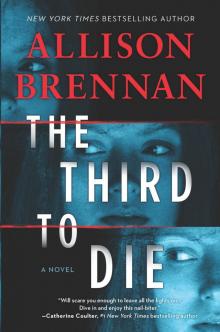 The Third to Die
The Third to Die Nothing to Hide
Nothing to Hide No Way Out
No Way Out Cold as Ice
Cold as Ice Cut and Run
Cut and Run No Way Out (Lucy Kincaid Novels)
No Way Out (Lucy Kincaid Novels) Storm Warning
Storm Warning Betrayed: Powerful Stories of Kick-Ass Crime Survivors
Betrayed: Powerful Stories of Kick-Ass Crime Survivors Killing Fear pb-1
Killing Fear pb-1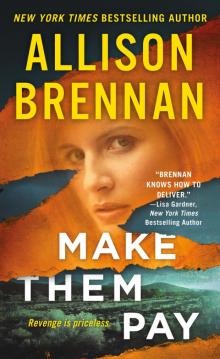 Make Them Pay
Make Them Pay The Lost Girls
The Lost Girls Stalked
Stalked Killing Justice
Killing Justice A Deeper Fear
A Deeper Fear Poisonous
Poisonous Fear No Evil
Fear No Evil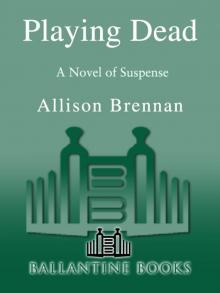 Playing Dead
Playing Dead Cold Snap
Cold Snap Vacation Interrupted
Vacation Interrupted Frosted (Moreno & Hart Mysteries)
Frosted (Moreno & Hart Mysteries) 2 - The Hunt
2 - The Hunt Stolen
Stolen No Good Deed
No Good Deed Cutting Edge
Cutting Edge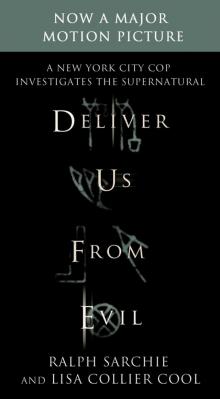 Deliver Us from Evil
Deliver Us from Evil If I Should Die
If I Should Die Speak No Evil
Speak No Evil Silenced lk-4
Silenced lk-4 Original Sin sds-1
Original Sin sds-1 Kiss Me, Kill Me lk-2
Kiss Me, Kill Me lk-2 What You Can’t See
What You Can’t See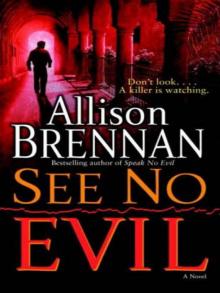 See No Evil
See No Evil The Prey
The Prey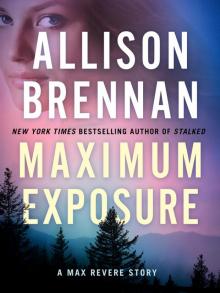 Maximum Exposure
Maximum Exposure Fatal Secrets f-2
Fatal Secrets f-2 Stalked lk-5
Stalked lk-5 Cutting Edge f-3
Cutting Edge f-3 Hit and Run (Moreno & Hart Mysteries)
Hit and Run (Moreno & Hart Mysteries) Sudden Death f-1
Sudden Death f-1 If I Should Die lk-3
If I Should Die lk-3 Notorious
Notorious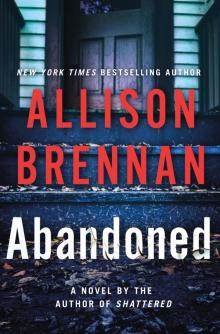 Abandoned
Abandoned Fatal Secrets
Fatal Secrets The Hunt
The Hunt Carnal Sin sds-2
Carnal Sin sds-2 Love Is Murder
Love Is Murder Lost and Found
Lost and Found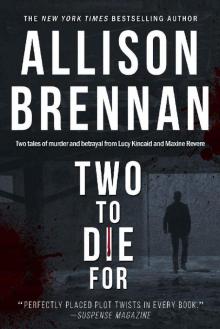 TWO TO DIE FOR
TWO TO DIE FOR Breaking Point
Breaking Point Best Laid Plans
Best Laid Plans Carnal Sin
Carnal Sin Silenced
Silenced Dead Heat
Dead Heat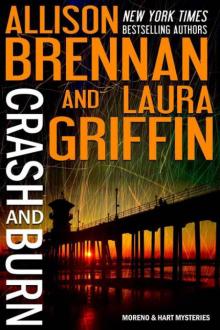 Crash and Burn
Crash and Burn Sudden Death
Sudden Death Lucy - 05 - Stalked
Lucy - 05 - Stalked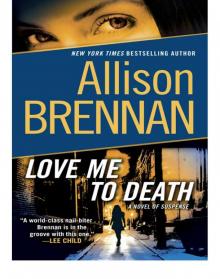 Mortal Sin
Mortal Sin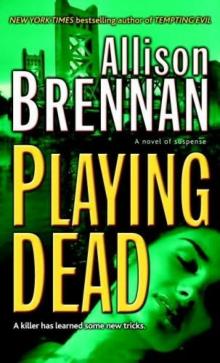 Playing Dead pb-3
Playing Dead pb-3 Kiss Me, Kill Me
Kiss Me, Kill Me Original Sin: The Seven Deadly Sins
Original Sin: The Seven Deadly Sins See No Evil e-2
See No Evil e-2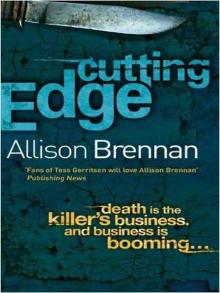 Cutting Edge: A Novel of Suspense
Cutting Edge: A Novel of Suspense Original Sin
Original Sin Too Far Gone
Too Far Gone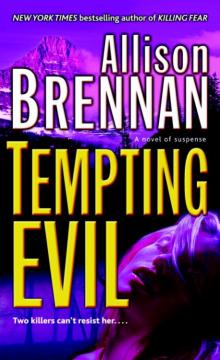 Tempting Evil
Tempting Evil Shattered
Shattered Killing Fear
Killing Fear Murder in the River City
Murder in the River City Love Is Murder (lucy kincaid)
Love Is Murder (lucy kincaid) Stolen (Lucy Kincaid Novels)
Stolen (Lucy Kincaid Novels)